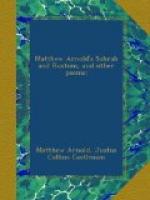“Such
is my destiny, such is the will of fortune.
It
was decreed that I should perish by the hand of my
father.”
—Shah Nameh.
=717. have found= (him). Note the ellipsis.
=723-724. I came ... passing wind.= The Shah Nameh has—
“I came like a flash of lightning, and now I depart like the wind.”
=736. caked the sand.= Hardened into cakes.
=751. Helmund.= See note, l. 82. [163]
=752. Zirrah.= Another lake in Seistan, southeast of Hamoon, now almost dry.
=763-765. Moorghab, Tejend and Kohik.= Rivers of Turkestan which lose themselves in the deserts to the south of Bokhara. The northern Sir is the Sir Daria, or Jaxartes. See note, l. 129.
=788. And heap a stately mound=, etc. Persian tradition says that a large monument, in shape like the hoof of a horse, was placed over the spot where Sohrab was buried.
=830. on that day.= Shortly after the death of Afrasiab, the Persian monarch Kai Khosroo, accompanied by a large number of his nobles, went to a spring far to the north, the location fixed upon as a place for their repose. Here the king died, and those who went with him afterward perished in a tempest. Sohrab predicted Rustum would be one of those lost, but tradition does not have it so.
=861. Persepolis.= An ancient capital of Persia, the ruins of which are known as “the throne of Jemshid,” after a mythical king.
=878. Chorasma.= A region of Turkestan, the seat of a powerful empire in the twelfth century, but now greatly reduced. Its present limits are about the same as those of Khiva. See note, l. 120.
=880. Right for the polar star.= That is, due north. =Orgunje.= A village on the Oxus some seventy miles below Khiva, and near the head of its delta.
=890. luminous home.= The Aral Sea.
=891. new bathed stars.= As the stars appear on the horizon, they seem to have come up out of the sea.
=875-892.= Discuss the poet’s purpose in introducing the remarkable word-picture of these closing lines of the poem. See also note, ll. 231-250, The Scholar-Gipsy.
SAINT BRANDAN [164]
In this poem Arnold has vividly presented a quaint legend of Judas Iscariot, popular in the Middle Ages. Saint Brandan (490-577) was a celebrated Irish monk, famous for his voyages. “According to the legendary accounts of his travels, he set sail with others to seek the terrestrial paradise which was supposed to exist in an island of the Atlantic. Various miracles are related of the voyage, but they are always connected with the great island where the monks are said to have landed. The legend was current in the time of Columbus and long after, and many connected St. Brandan’s island with the newly discovered America. He is commemorated on May 16.”—The Century Cyclopedia of Names.




